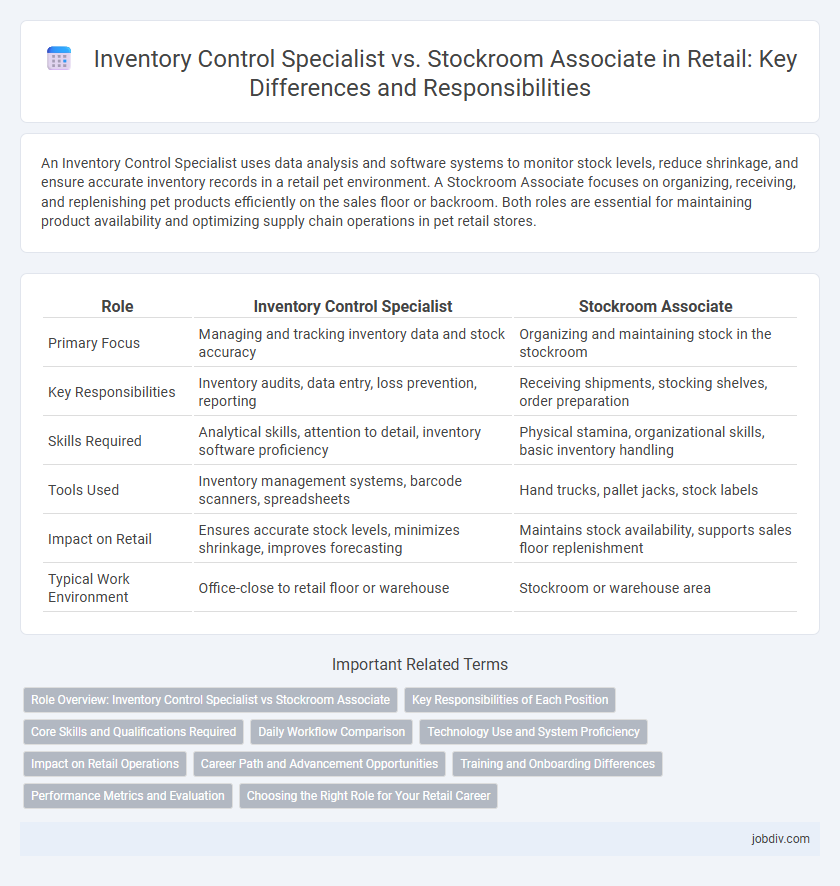An Inventory Control Specialist uses data analysis and software systems to monitor stock levels, reduce shrinkage, and ensure accurate inventory records in a retail pet environment. A Stockroom Associate focuses on organizing, receiving, and replenishing pet products efficiently on the sales floor or backroom. Both roles are essential for maintaining product availability and optimizing supply chain operations in pet retail stores.
Table of Comparison
| Role | Inventory Control Specialist | Stockroom Associate |
|---|---|---|
| Primary Focus | Managing and tracking inventory data and stock accuracy | Organizing and maintaining stock in the stockroom |
| Key Responsibilities | Inventory audits, data entry, loss prevention, reporting | Receiving shipments, stocking shelves, order preparation |
| Skills Required | Analytical skills, attention to detail, inventory software proficiency | Physical stamina, organizational skills, basic inventory handling |
| Tools Used | Inventory management systems, barcode scanners, spreadsheets | Hand trucks, pallet jacks, stock labels |
| Impact on Retail | Ensures accurate stock levels, minimizes shrinkage, improves forecasting | Maintains stock availability, supports sales floor replenishment |
| Typical Work Environment | Office-close to retail floor or warehouse | Stockroom or warehouse area |
Role Overview: Inventory Control Specialist vs Stockroom Associate
Inventory Control Specialists manage accurate tracking and reconciliation of inventory data, ensuring optimal stock levels and preventing shrinkage through advanced reporting systems. Stockroom Associates handle the physical organization, receiving, and replenishing of merchandise within the stockroom, maintaining cleanliness and accessibility. While Inventory Control Specialists emphasize data accuracy and inventory analysis, Stockroom Associates focus on operational support and order fulfillment.
Key Responsibilities of Each Position
Inventory Control Specialists manage accurate tracking of inventory levels, conduct regular audits, and optimize stock replenishment processes to prevent overstocking or stockouts. Stockroom Associates handle the receiving, organizing, and storing of merchandise, ensuring items are correctly labeled and accessible for sales floor restocking. Both roles collaborate to maintain inventory accuracy, with specialists focusing on data analysis and forecasting, while associates emphasize physical stock management.
Core Skills and Qualifications Required
Inventory Control Specialists require strong analytical skills, proficiency in inventory management software, and experience with data reconciliation to maintain accurate stock levels and prevent losses. Stockroom Associates need physical stamina, basic organizational abilities, and knowledge of stock handling procedures to efficiently receive, store, and distribute merchandise. Both roles benefit from attention to detail, but Inventory Control Specialists emphasize data accuracy and reporting, while Stockroom Associates focus on logistical support and inventory movement.
Daily Workflow Comparison
Inventory Control Specialists monitor stock levels using advanced software systems to ensure accuracy and prevent discrepancies, while Stockroom Associates focus on physically receiving, organizing, and replenishing products on shelves. Specialists analyze inventory data daily to forecast needs and coordinate with purchasing teams, whereas Associates prioritize timely stock rotation and maintaining cleanliness in storage areas. Both roles contribute to efficient inventory management but through distinctly different operational tasks within retail environments.
Technology Use and System Proficiency
Inventory Control Specialists leverage advanced inventory management software and data analytics tools to monitor stock levels, optimize reorder points, and reduce shrinkage, ensuring accurate and efficient inventory tracking. Stockroom Associates primarily use handheld scanners and basic warehouse management systems to receive, organize, and distribute merchandise, focusing on physical handling and data entry accuracy. Proficiency in ERP systems and real-time inventory tracking platforms distinguishes Inventory Control Specialists from Stockroom Associates, highlighting a higher technological expertise required for strategic inventory oversight.
Impact on Retail Operations
Inventory Control Specialists enhance retail operations by meticulously tracking stock levels, reducing shrinkage, and optimizing reorder processes to maintain product availability. Stockroom Associates support daily functions by efficiently receiving, organizing, and replenishing merchandise, ensuring smooth inventory flow and timely restocking on sales floors. Together, their roles minimize stock discrepancies and improve overall customer satisfaction through consistent inventory accuracy.
Career Path and Advancement Opportunities
Inventory Control Specialists typically advance by developing expertise in supply chain management and data analysis, often moving into roles such as Inventory Manager or Logistics Coordinator. Stockroom Associates usually start with foundational stock handling skills and can progress to supervisory positions like Stockroom Supervisor or Warehouse Lead by gaining experience in inventory processes and team management. Career growth for both roles depends on acquiring proficiency in inventory software, strong organizational skills, and understanding retail operations.
Training and Onboarding Differences
Inventory Control Specialists undergo comprehensive training focused on data management, inventory tracking systems, and analytical skills to optimize stock accuracy and reduce discrepancies. Stockroom Associates receive practical onboarding that emphasizes physical handling, organization of merchandise, and basic inventory procedures to maintain efficient storage and retrieval processes. The specialization level in training for Inventory Control Specialists supports advanced inventory audits, while Stockroom Associates are trained for day-to-day operational support.
Performance Metrics and Evaluation
Inventory Control Specialists are measured primarily by inventory accuracy rates, shrinkage reduction, and audit compliance, reflecting their role in maintaining precise stock records and minimizing losses. Stockroom Associates' performance metrics center on order fulfillment speed, stock replenishment efficiency, and adherence to safety protocols, emphasizing operational productivity and organized storage. Evaluation of both roles integrates quantitative data such as cycle count discrepancies and pick rates, aligning workforce contributions with overall retail inventory management goals.
Choosing the Right Role for Your Retail Career
Inventory Control Specialists manage accurate stock levels through data analysis and systematic audits, ensuring seamless supply chain operations. Stockroom Associates focus on organizing, receiving, and replenishing inventory to maintain efficient store floor availability. Selecting the right role depends on whether you prefer analytical responsibilities or hands-on inventory handling in your retail career.
Inventory Control Specialist vs Stockroom Associate Infographic

 jobdiv.com
jobdiv.com